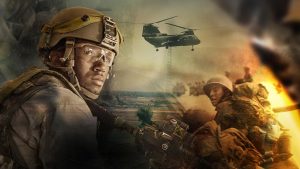Pacifism and the Soldier–Part 3

‘Going to War’ by Karl Malantes, a Vietnam veteran and author of ‘Matterhorn: A Novel of the Vietnam War,’ and ‘What It Is Like to Go to War’ and war correspondent/author Sebastian Junger is a documentary about soldiers in Vietnam and the Middle East. It aired on PBS on Memorial Day and can be accessed on Amazon and PBS. I rented it for $5.99 and wrote the notes below in my own words.
LbpDeUJ-asset-mezzanine-16×9-pPLyU3q.jpg.crop.1534×864.jpg
Notes:
Although war is chaos, soldiers experience loyalty, courage, and intense focus. Even if they never sign up again for the military, some say they miss the purpose and sense of family they had in combat. There is terror and exhilaration. You are never more alive.
Boot Camp:
More than patriotism, it is an adventure for a young person, a throwing of oneself against the challenge. Boot camp is an initiation. Grunts are treated like dogs, but they are made into a collective being, a radical shift from the selfishness of youth to being part of a group. You cannot think for yourself in combat, you must think of the group. Teammates must raise the weakest one to the highest level so that the team works.
Combat:
Nothing can prepare you for it. Your first impressions when you see the hardened soldiers passing you and not looking at you is: ‘Someone is going to die.’
Your first feeling is ‘Where am I and how did I get here?’ Karl Marlantes talks about holes being shot into the helicopter he was in, and mortars and bullets. He was thinking ‘I’m alive because I can hear the mortars.’ He says it’s an existential crisis. ‘I’m alive or I’m dead.’
The immediacy and focus of combat makes you laugh that anyone would need meditation, Brian Castner says. ‘Get shot at and you are fully present in the zone, you are locked in.’ ‘Training kicks in, fear dissipates, I’m in the zone and I’m throwing lead,’ states Morocco Coleman. Lisa Crutch tells of firing her 50 cal machine gun on the back of a truck, hearing the bullets go past her ears but not caring. Harrison Manyoma makes us smell the smell of burnt flesh.
Junger says that if you survive a firefight you are ‘cranked,’ then depressed, then cranked again in the next firefight. Marlantes calls it a primitive state of mind. It’s us and them; get them before they get me. The terms Gooks, Towel Heads, Nips, Krauts and such phrases as ‘Go out and get some,’ create a system in which enemies are not human beings. It’s them or my guys.
Marlantes tells of killing a VC up close, while whispering to the young man not to throw his hand grenade. Another Vietnam veteran, Ken Clark, tells about shooting a man and seeing his bloody guts as he died in the water of a rice patty. These events haunt both men and women in combat. Junger reminds us how incredibly sad it is that boys on one hill are trying to kill the boys on another hill. All, though, as they contemplate their time in combat, find that is was a time in which they were focused and fully alive.
Casualties:
MJ Hegar, a woman medivac pilot in Iraq tells a story of how happy she was the day she learned she would get into the action. She helped rescue a wounded warrior who was revived in the helicopter but died when they returned to base. She says that she tells this story as penance for being so thrilled about the mission. For her to see action, she says, somebody else had to have a very bad day. A.B. Grantham tells about Hue, Vietnam, where the soldiers started out the day with 53 men and soon were down to 28 men. The second day, he was wounded so badly that he was presumed dead and put into a body bag. Someone realized that he was still breathing and pulled him out.
Junger tells of the guilt he can’t help but feel about his friend, cameraman Tim Hetherington, dying in Iraq. Junger’s only transgression was being back in the States at the time.
The soldiers say: You must not let your friends down. War is love, brotherhood and sisterhood, based on suffering.
Loss:
Marlantes sent a good friend of his into the middle of a fight. Thomas had saved Marlantes ilfe, but the firefight demanded that Thomas go ahead. He was killed.
Other soldiers say: ‘Your blood is up, they kill your friend and you want to make them pay. War is an assault on your senses, including right and wrong. You’re tired of being scared, It’s payback time. You want revenge.’
Brian Castner tells a particularly accessible story. He arrived at the scene just after six car bombs went off in an Iraqi city. His job was to make sense of things and try to keep his men safe. Iraqi women started screaming, wanting to know what happened. They screamed and screamed. At one point, he says, he just wanted them to shut up and he considered shooting them. It was what he calls a ‘lowering of the bar.’ He was given a gun by his country and told to kill people. He had permission to do so. He learned then that he was capable of doing things against his normal conscience, and that was when he decided that it was time to go home.
Coming Home:
You sit in the dark at your parents’ home. You can’t put it behind you. Your mom asks to see your old self and you tell her that self is gone. It died in the war.
You love your children and family, but you can remember each day of the war much better than the things that have taken place in your family before the war.
Fifteen years after the war, Marlantes is driving down a highway at night. Suddenly the eyes of the VC he knows he shot (there may have been others) rise up in the wind shield and he realizes fully that he killed another human being.
Junger says that soldiers carry emotional and psychological burdens, especially if they are not properly reincorporated into society. We must all face that war is ugly, he says.
Ken Clark held back everything about Vietnam because nobody wanted to hear him. One day his son climbed into a tree to get a soccer ball. The son was wearing black shorts (cut to the black ‘pajamas’ worn by the VC.) The wind was whipping through the tree, making the branches move quickly (cut to a helicopter.) Suddenly Clark was back in Vietnam, completely and totally. That day, he put his gun and ammunition as far back in the garage as he could.
It’s hard to move on.
‘Thank you for your service,’ is an uncomfortable phrase, for those interviewed in this documentary. Some say they were just doing their jobs; Jason Wheeler says he fought with malice and hate. ‘Lady, if you knew the monster that lived in me, you wouldn’t want to be near me right now.’ After coming back from Iraq, Wheeler was invited to a nice restaurant for an expensive steak and it suddenly occurred to him that everybody in that room was clueless. They didn’t know that somewhere in the world, a twenty-year-old kid was trying not to get killed.
Dennis Mosely considers it a fate worse than death to let down your comrades in battle. You just don’t do it. Others call combat and comaraderie a band of brothers and a form of love. Soldiers miss the brotherhood; somebody has your back. In the real world it’s dog eat dog.
Tyson Manker provides a key moment. ‘I wish more of the American public understood war the way that warriors understand war because we would be much more frugal in our use of young women and men who are dying right now, still.’
Junger feels that civilians don’t understand that they have permission to ask about the war. Harrison Manyoma says ‘It’s very important to tell—your story because we just want to be heard. [We want] someone to understand what we went through. When we [can] give our details and someone receives, there is a sense of no judgment—of being safe—[and] we start to forgive ourselves. Marlantes says that if soldiers can tell their stories without fear and are accepted without judgment, we all become whole.’
Junger says that war is what it means to be human; that war along with great sadness and ugliness shows ‘the most noble and admirable human traits on full display.’ When we talk about war, he says, we talk about what it means to be human. He says that war is ancient, it is not an abberation, it is universal.
__________
I must argue that war may be what it means to be the male of the species, (even though women are now fully involved in combat.) Consider the male struggles for domination of the harem in nature. The documentary leads us to the rough feelings and behaviors war requires, but it clearly shows that we as humans are capable of not only going to war but of contemplating our actions when not in combat. And we are capable of practicing noble and admirable traits throughout our lives. I do know that Junger was stating a passionate plea that we who have not been in combat understand what soldiers experience and that we allow them to speak.
As to the wonderful sense of comaraderie, we all want that. We also want to be goal oriented and part of something bigger and better than ourselves. Anabaptists experience these things. They work together, pray together, and lead out into the world with a message against war. From the time a young boy is told not to make his fist and fingers into a pretend gun, he feels the weight of Anabaptism. We don’t baptize an individual until he (she) is old enough to make the decision for himself (herself.) Thus, the responsibility to think about what it means to be Anabaptist is ever with our kids. Forever, our boys must think about alternatives to fighting and war. A young man must search for those alternatives and be involved in them, whether on the playground, on his sports teams, during draft age, or in voluntary service as an adult.
In addition, all of us want to be heard and accepted with less of the judgment that we are handing out to each other today.
Imagine the conversations among a soldier, an aid worker, and a Christian Peacemaker Team member, all of whom have served time in Iraq. They may not agree on war, but they will listen to the other and perhaps value and understand each other much better than those of us who shout over the chasms of today’s politics and religions.

Photo by Jonas Wurster on Unsplash
Next week in Pacifism and the Soldier–Part 4: Service.
__________
I welcome your comments: gretaholtwriter.com/blog. Please enjoy a few short stories on the Home page, as well.
{Thank you to my niece, Addie Liechty, for taking the picture above that is this blog’s featured image. Her blog is: https://addieswriting.wordpress.com.}
Best wishes and have a good week.
Greta

Very powerful post, Greta. As a writer of nonfiction, I am very interested in helping people find the space to tell their stories–and be heard. It seems that there is often not much space available for vets to do that.
Agreed. They are honored but not heard. I wish you so much joy as you tackle your new project!